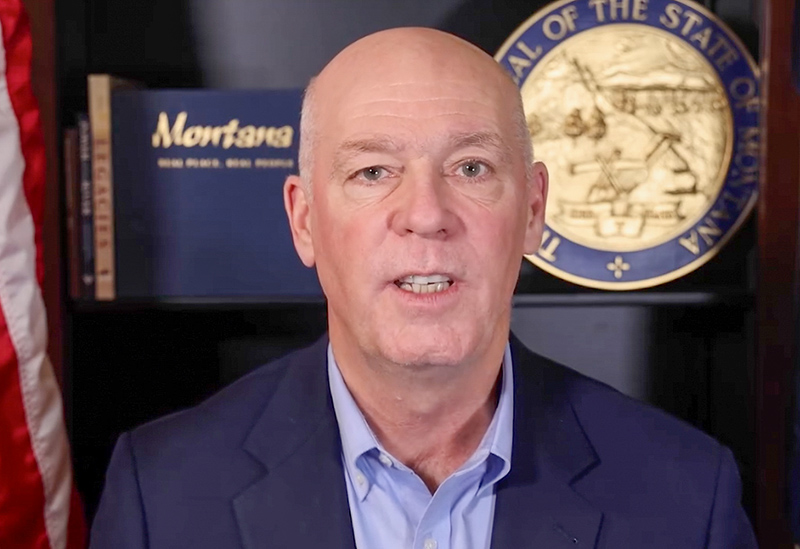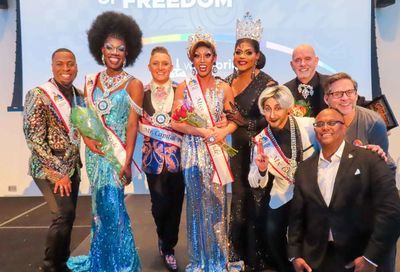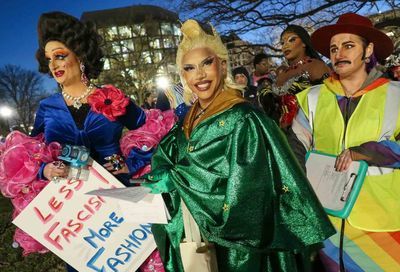Judge Blocks Arizona’s Ban on Transgender Athletes
Two transgender girls, both of whom are on puberty blockers, argue that they do not hold an unfair advantage over cisgender athletes.

A federal judge has blocked Arizona from enforcing a law prohibiting transgender athletes from competing in female-designated sports.
U.S. District Judge Jennifer Zipps, of the District of Arizona, granted a preliminary injunction blocking the state from enforcing the Save Women’s Sports Act. The law prohibits transgender female athletes from competing in sports matching their gender identity and allows cisgender students to sue for damages if they believe they have lost out on an athletic opportunity after being forced to compete against a transgender athlete.
The ban on transgender athletes was challenged by a 15-year-old volleyball player, referred to as Megan Roe, and an 11-year-old, referred to as Jane Doe, who wishes to play girls’ soccer, basketball and cross-country. Because neither has yet undergone male puberty, and both are on puberty blockers, they argue they don’t have a physical or physiological advantage and should be allowed to compete on teams matching their gender identity.
In her order granting the injunction, Zipps found that the law is “overly broad” because it bans transgender female athletes, including those at the elementary school level, from girls’ sports teams, despite the lack of evidence proving that pre-pubertal athletes hold some physiological or unfair competitive advantage over other children based solely on their assigned sex at birth.
She also noted that the ban treats transgender boys and transgender girls differently, noting that transgender boys — whom the state and proponents of the ban refer to as “biological girls” — are permitted to play on male-designated teams, despite the alleged physical risks that they would presumably face by competing against “biological male” athletes.
Zipps also noted that, under the law, even cisgender female athletes can be investigated and forced to submit to genetic testing to “prove” their biological sex.
“The Act subjects only female athletes, transgender and otherwise, to gender challenges and investigations,” Zipps wrote. “Boys playing on boys’ teams do not have to worry about any gender challenge or investigation.”
Critics have previously maintained that such challenges will be used to block cisgender female athletes from playing if they are deemed too “masculine,” don’t conform to stereotypes about femininity, or display gender-nonconforming behavior. They have also alleged that some coaches or parents from opposing teams will use the law to challenge an athlete’s gender identity, regardless of a lack of evidence, simply to “sideline” that athlete and give their own athletic team a competitive advantage.
Zipps found that Doe and Roe are likely to succeed in proving Arizona’s specific ban on transgender athletes to be unconstitutional.
“The legislative history demonstrates that the purpose of the Act is to exclude transgender girls from girls’ sports teams. Therefore, the Court applies heightened scrutiny to the Act, does not make a presumption of constitutionality, and does not defer to legislative judgment,” Zipps wrote.
“According to Defendants, the Act is to protect girls from physical injury in sports and promote equality and equity in athletic opportunities, which are, in addition to redressing past discrimination against women in athletics, considered legitimate and important governmental interests justifying rules excluding males from participating on female teams,” she added. “However, the well-established scientific consensus is that, before puberty, there are no significant physiological differences in athletic performance between boys and girls. Instead, there is overlap between the sexes, with some boys being better athletically than some girls and some girls outplaying some boys.
“There is also no evidence that transgender girls who do not undergo male puberty because they have taken puberty suppressing medication at the onset of male puberty have an athletic advantage over other girls,” Zipps continued. “There are no studies that have documented any such advantage, and there is no medical reason to posit that any such advantage would exist.”
Arizona Superintendent of Public Instruction Tom Horne, one of the defendants in the case, promised to appeal the ruling
“The Plaintiffs, in this case, claimed that this only involves pre-pubescent boys, but we presented peer-reviewed studies that show pre-pubescent boys have an advantage over girls in sports,” Horne said in a written statement, according to Arizona’s Family, a bundle of news stations including independent station KTVK and Phoenix-based CBS affiliate KPHO. “The only expert presented by the Plaintiffs was a medical doctor who makes his money doing sex transition treatments on children and who has exactly zero peer-reviewed studies to support his opinion.”
Lawyers for the student-athletes celebrated the judge’s decision.
“We are very pleased with the Court’s decision that allows our clients to play on girls’ sports teams while the case proceeds,” Rachel Berg, a staff attorney with the National Center for Lesbian Rights, said in a statement. “The Court recognized the law is overbroad and cannot survive constitutional scrutiny. We look forward to securing a permanent ruling.”
Both athletes’ parents also praised the decision.
“We’re happy with this decision, of course, and our daughter is thrilled to join her friends playing the sports they all love,” Kate and Robert Roe said in a statement.
“We are pleased by the court’s decision. Our daughter and all girls deserve the opportunity to reap the benefits of school sports,” Helen and James Doe added. “We are relieved that the judge saw past the misconceptions and harmful rhetoric used to demonize transgender girls. Our daughter is looking forward to making new friends and playing the sports that she loves.”
Support Metro Weekly’s Journalism
These are challenging times for news organizations. And yet it’s crucial we stay active and provide vital resources and information to both our local readers and the world. So won’t you please take a moment and consider supporting Metro Weekly with a membership? For as little as $5 a month, you can help ensure Metro Weekly magazine and MetroWeekly.com remain free, viable resources as we provide the best, most diverse, culturally-resonant LGBTQ coverage in both the D.C. region and around the world. Memberships come with exclusive perks and discounts, your own personal digital delivery of each week’s magazine (and an archive), access to our Member's Lounge when it launches this fall, and exclusive members-only items like Metro Weekly Membership Mugs and Tote Bags! Check out all our membership levels here and please join us today!
























You must be logged in to post a comment.